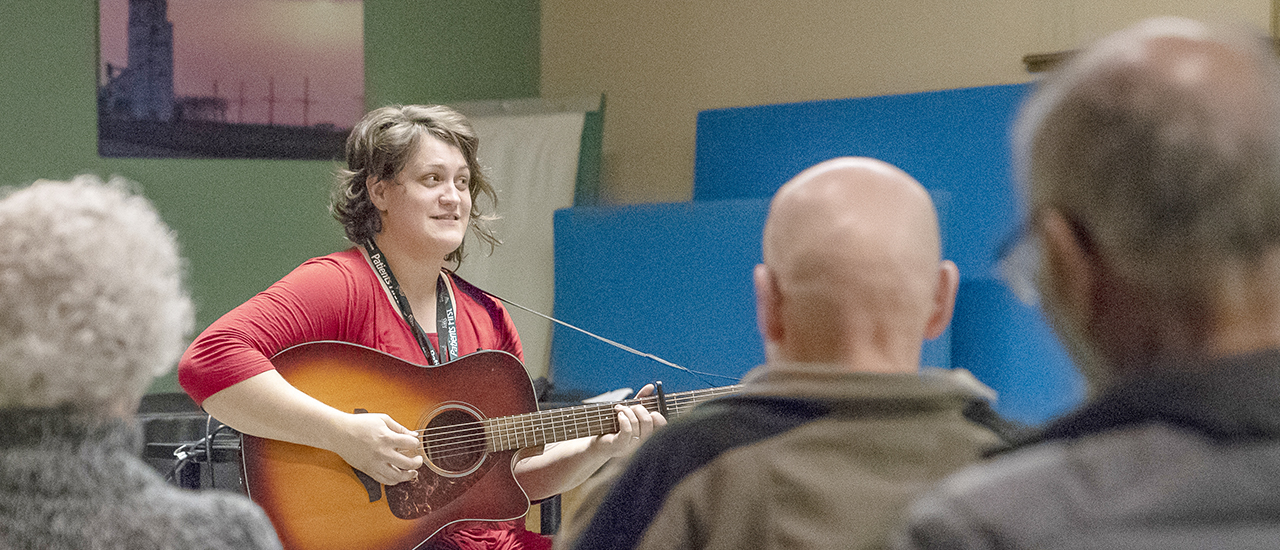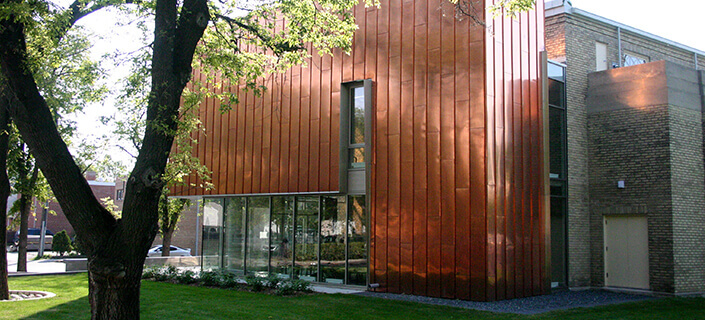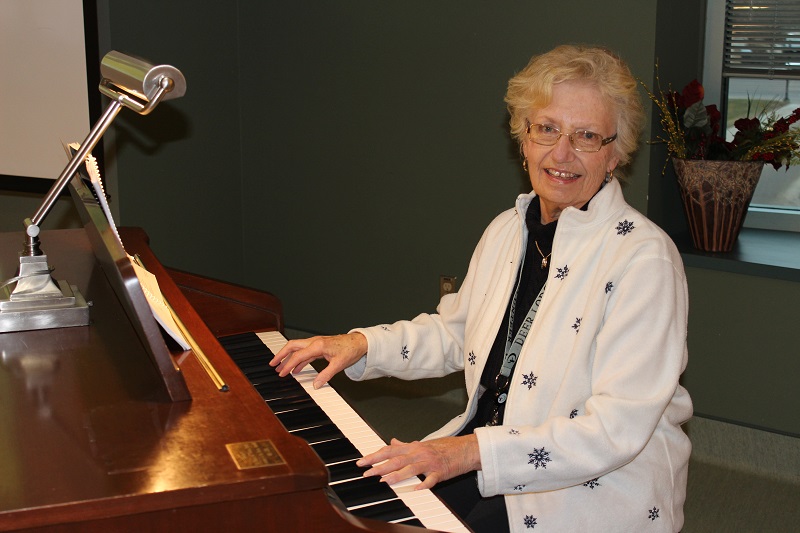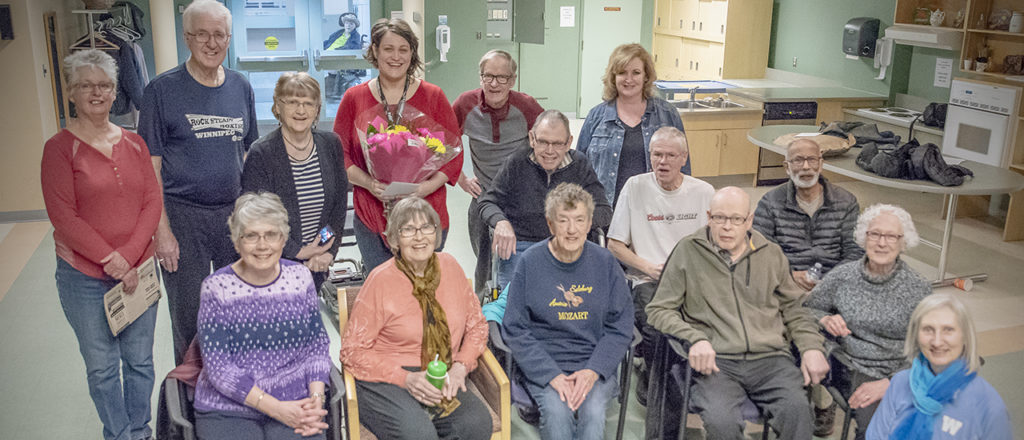
Deer Lodge Centre’s Parkinson’s choir blends music, therapy
By Ryan McBride
“Happy trails to you,” the voices sing, “until we meet again.” But it doesn’t sound like goodbye. As the choir slowly disperses—some members in wheelchairs or leaning on walkers, others hanging on a friendly elbow—you sense pride in a song well sung. The last notes linger in the air long after the singers have gone.
This may be the final session of Deer Lodge Centre’s Parkinson’s choir pilot project, but you get the feeling the music will continue.
For the past seven weeks they’ve gathered at Deer Lodge to make music together: more than a dozen people living with some stage of Parkinson’s disease, a disorder of the nervous system that affects movement and speech.
Although Deer Lodge has offered music therapy to its patients and residents in the past, this Parkinson’s choir is the first of its kind in Manitoba and unique to the Centre, says Gillian Barnes. A speech language pathologist at the Movement Disorder Clinic located on the Centre’s grounds, she was inspired to start the choir after watching one perform at the World Parkinson’s Congress in Montreal in 2013. Impressed by the choir’s therapeutic potential, she contacted the music therapy program at the Canadian Mennonite University. The Movement Disorder Clinic, along with Deer Lodge Centre, was hoping to find a student who would be interested in a practicum placement that would allow the student to act as both music therapist and choir leader.
That student was Heitha Forsyth. Now playing the final measures of her music therapy degree, Forsyth has been performing in Winnipeg under the name Sol James for the past 10 years. As an Artist in Healthcare at Misericordia Health Centre, she worked with residents in long-term and interim care; at St. Amant Centre, she worked as a specialized tutor for a child with autism.
Both experiences inspired her to pursue her current path. “I realized music therapy was the perfect means to bring my two passions together into something even more meaningful.”
Accredited music therapists are trained to work with a wide range of populations, including adults with eating disorders, children with disabilities, infants, and people living with dementia and intellectual disabilities. Adapting her skills to people with Parkinson’s has proven challenging but rewarding, says Forsyth. “We work with you where you’re at and try to push you farther.”
The choir was open to anyone in the city living with Parkinson’s, a disease affecting one in 500 Canadians. Symptoms of the disease gradually worsen over time and most often strike between the ages of 50 and 70. They include tremors, slowed movements, rigid muscles, impaired posture and balance, and speech and swallowing problems. People with Parkinson’s disease may speak softly, quickly, slur their words, or hesitate before talking. Their speech may become monotone and lose many of its inflections.
Barnes and Forsyth saw how integral music therapy could be to treating the disease, which has no known cure.
Some of the techniques Heitha brought to the choir belong to an approach called neurologic music therapy, which aims to build motor and sensor function, speech, language, and cognition. Some use rhythm and harmony to stimulate movement. Others use chanting to improve voice and breath control.
But there’s more to music therapy than just singing. By incorporating a bouncing ball into exercises where she and choir members sing back and forth, for instance, Forsyth can also help maintain motor skills.
“Research demonstrates that exercise significantly hinders the progression of Parkinson’s. In our sessions we do small physical exercises—snapping, clapping, stomping. For some, it’s a more appealing alternative to other exercise options out there.”
Best of all, the choir motivates members because it addresses the emotional dimension of living with Parkinson’s, a disease that often leaves people feeling helpless. “People turn to music for comfort, expression, and community. Joining a choir like this can be hugely empowering.”
“Parkinson’s is a degenerative disease,” adds Barnes. “To bring hope, song and laughter to our members is invaluable.”
While each case of Parkinson’s is different, some forms of music therapy can “do amazing things” for the right patient, says Barnes. Choral therapy is a well-researched and rigorous approach to music therapy.
“We look like we’re having a lot of fun, but there are reasons for everything I pull into a choir session,” Forsyth explains. She assesses members by observing their communication, social, physical and cognitive abilities.
“After the first session I tailored our activities to the range of deficits I observed. There was quite a range. I could have aimed different therapeutic techniques at different members, or moved people forward in smaller groups, but I thought it was really important for us to move forward together as one choir.”
That strategy made the choir a whole lot stronger, says Barnes, who has a long-standing relationship with many of the group’s members due to her role at the Movement Disorder Clinic, which serves over 1,500 clients in Winnipeg a year.
“It didn’t matter how their Parkinson’s was impacting their abilities, or how easy or challenging they found the exercises. Music put everyone on an even playing field. They were all just people gathering to sing, and as time went on, I could see their confidence growing and their interactions with one another increasing, including some who were usually more withdrawn.”
The pilot project culminated in a live performance at the Victory Summit, a national educational event hosted by the Davis Phinney Foundation in Winnipeg on April 7. Watching the choir listen to a recording of their performance at their final meeting, Barnes observes: “If you compare how they sound now to their first session only seven short weeks ago, you can hear so clearly how much better they sing as individuals and as a group. It’s incredible.”
Now that the pilot project is over, she hopes the choir will return in September and continue to sing together on an ongoing basis. “We can advance to more complex harmonies and melodies, for example. There’s plenty more we can do,” she says, “plenty more songs to be sung.”
In the meanwhile, “Happy trails to you, keep smiling on ‘til then…”
Recent News

Embracing Hope: The Impact of DLC’s Movement Disorder Clinic

Winnipeg Jets Parkinson’s Disease Awareness Game!


